- Home
- Karen Azinger
The Steel Queen (The Silk & Steel Saga Book 1) Page 11
The Steel Queen (The Silk & Steel Saga Book 1) Read online
Page 11
The price was outrageous but Samson didn’t argue. Three wagons down, they came to the turnip farmer. He was short and fat, with shifty eyes and Samson didn’t like the look of him, but before he could say anything, the farmer leaned down and whispered, “It’s late in the day, boyo, and you’re lucky I haven’t sold my seats in the wagon. Thirty golds will get you and the old lady a ride to the other side of Hillsbrook, but I’ll see the golds first.”
Samson stared slack-jawed. The farmer was asking for more than half the golds in his purse for a ride that would only take them as far as the first village south of Balor.
“Close your mouth, boyo, you won’t catch any flies that way,” the farmer said in a snide voice. “I’m the only farmer who’s still giving rides to heretics, so pay the gold or go somewhere else...unless of course you want to buy my turnips?”
Samson was desperate. “Fine, but half the golds now and the other half when we get to the village.”
“Fair enough, laddiebuck, now bury those rucksacks under my turnips before you attract any more attention and get the old lady up on the front seat while I hitch my team.”
He handed the farmer the golds. Once he got his mother settled, he spied a farmer selling apples and realized he hadn’t eaten since early that morning. His stomach rumbling with hunger, he decided to buy a few before they left. While he was choosing a dozen, the apple-seller leaned over and whispered, “Saw you talking to Chammers, the turnip farmer. You can trust him to get you as far as Hillsbrook but if you sleep in his barn you’ll wake to find swords in your face. Pay him for the night in the barn or he’ll be suspicious; just make sure you’re long gone before sunrise.”
Samson stared at the man.
“Lots of people fleeing Balor these days,” the apple farmer went on. “Most farmers used to help till the guards made an example of the ones that did. Farmers aren’t immune to the Flames, you know. Chammers is the only one who still runs heretics.” He lowered his voice to a whisper. “He’s cut a deal with one of the guard captains. The guards let him through the city gates and then the good captain is proclaimed a hero when he captures the runaways in his barn the next morning. Chammers and the captain split your golds. A lot more golds in running heretics than there is in turnip farming.” He handed Samson a twelfth apple with a knowing look and then got back atop his wagon, hawking his apples in a loud voice.
Samson walked back to the turnip farmer’s wagon in a daze. He climbed up onto the seat and handed his mother an apple. He took another for himself and just held it in his hand, amazed that the simple whim to buy an apple could turn out to make all the difference between life and death.
As they approached the city gates, Samson sat hunched down in his seat but it didn’t seem to matter, for none of the guards challenged the wagon.
On the ride south, Chammers regaled them with stories of all the people he’d saved from the Flame. Samson listened in silence, clutching the golden apple tight in his hand. A short time later, the wagon exited the village of Hillsbrook and turned onto the farmer’s land. As they pulled up to the barn, Chammers said, “Got you here safe just as I promised. I’ll take my other fifteen golds now.”
Samson helped his mother down from the wagon, retrieved his rucksacks and then paid the man his money. Chammers smiled, pocketing the gold. “You and the old lady have had a long day. Why don’t you spend the night in my barn? Sweet-smelling hay to sleep on and a barrel of water to wash with. Only cost you a gold apiece for the night.”
For that price, Samson could spend a fortnight in a good inn with a hot dinner served in his room every night. Instead of arguing, he fished out two golds.
Laughing, Chammers bid them a good night. Samson closed the barn door and then settled his mother in the hay. While she slept, he kept watch, waiting for the depths of night. By the light of the crescent moon, he and his mother slipped out of the barn and began their long walk south. They walked at night and hid by day. With his mother on his arm, their progress slowed to a hobbled walk, but they did the best they could.
The long march south took its toll. When the apples ran out Samson used his money to buy food but the prices were outrageous and his coin did not last long. When the money ran out, he bartered away two of the rucksacks. After that, he was forced to beg for food, for a ride in a wagon, or for shelter. A few people helped, but most turned him away with stony faces, or worse, threw rocks to drive him off.
He saw other refugees on the road or in the woods, but they were afraid of strangers and always kept their distance. All the refugees had the same haunted look in their eyes.
It seemed to Samson that there was no charity, no heart, left in the people of Coronth, one more thing burned to ashes by the Flame God. Too numb to think, he kept putting one foot in front of the other, walking an endless road south, desperate to escape the reach of the priests.
18
Katherine
The bodice of the gown threatened to suffocate Kath. She plucked at the bindings, needing to breathe. Oblivious to her discomfort, the two seamstresses fluttered around like butterflies, making final adjustments and babbling about the proper way to walk and the correct way to curtsy. Kath escaped at the first opportunity, changing into her squire’s garb and disappearing to a remote part of the castle.
Leaving was hard. She didn’t want to forget anything. She ran to the deserted basement of Needle Tower where she’d learned to throw her axes. Lighting a torch, she closed the great wooden doors and gave the Empty Knight a last inspection. The chalk outline was almost invisible but the many axe cuts had carved a crude head and torso into the door. Running her hand across the rough carving, Kath smiled knowing her first sparring partner was now a permanent part of Castlegard. Saluting the Empty Knight, she ran for the master healer’s quarters.
She entered the healery without knocking and found the inner doors closed; Master Quintus must be with a patient. Settling into the master’s stuffed armchair, Kath waited, studying the clutter on the master’s desk.
At last the door opened and the healer shepherded out a knight with a bandaged arm. “Come back tomorrow. You’ll be fine as long as the wound doesn’t fester.” The master closed the outer door and turned to face Kath. “So you’re to be fostered in Lanverness.”
Kath scowled. “I came to ask if you’ve learned anything more about my gargoyle?” She set the small figurine on the corner of his desk.
“I wrote to my friend but I’ve yet to get a reply. Your little gargoyle may have been lost since the War of Wizards.” The master began to rummage through the drawers of his desk, eventually producing a long thin strip of leather cord. “It might be better if you wore the gargoyle around your neck as opposed to putting it in your pocket. Pockets are easily picked, especially on the road.” With Kath’s assent, the master deftly wrapped the leather cord around the neck of the small statue and then made a larger loop, tying it fast with a healer’s knot. He gently settled the loop around her neck. “Remember, there are those who would kill to obtain your little gargoyle, so keep it hidden. Someday it might save your life.”
Nodding, she tucked the small figurine inside her squire’s tunic, the stone cold against her skin. “But how will I learn what it does?”
“The key is in your dreams. Understanding will eventually come. Magic is very powerful, especially in a world where it is almost forgotten.”
She bit her lip. “Thank you for your help.”
“There will be others to help you.”
“Who?”
“It’s not for me to say. They will find you in their own time.”
“But how will I know them?”
“Use your own judgment. Trust only those who give you the freedom to choose your own path. Make your own destiny, Kath. Don’t wait for others to define your life.”
A shiver ran down her back.
The master looked away. “Now you best be off. I’m sure you have many things to do before your departure tomorrow.”
Kath went
to leave but then turned back, ambushing the healer with a quick hug, and then sprinted for the door, wiping her sleeve across her eyes. Blurry-eyed, she sprinted through the great yard and headed for the forge.
The sound of hammers hitting anvils cheered her mood. Always a hive of activity, Castlegard’s forge never slept and she always felt comfortable among the weapon smiths. Slipping inside, Kath stood in the corner, out of the way. Basking in the heat, she breathed in the familiar scents of hot metal, burning charcoal, and sweat. She imagined the forge smelled like the breath of dragons and that every weapon made was meant for the hand of a hero. Cloaked in shadows, she watched as her friends worked red-hot steel into new blades. She scanned the forge searching for Master Otto, wanting to thank him again for her throwing axes, but things did not go as planned. A bellows boy noticed her standing in the corner and let out a cry of, “The princess!”
The ring of the hammers stopped and everyone turned to look. The master swordsmith stepped from the backroom, a broad smile on his soot-stained face. “We hoped you’d come by today. We’re all going to miss you.” One of the bellows boys emerged from the back of the forge and rushed to hand Otto a bundle of rags. The master extended the bundle to Kath. “These are for you, so you won’t forget your friends in the forge.”
Surprised and touched, Kath accepted the bundle. Unwrapping the rags, she found a slender dagger in a supple doeskin sheath with leather ties at the top and bottom. She drew the dagger, examining the blade. Six inches of fine Castlegard steel with the mark of the octagon on the small cross hilt, a dagger worthy of a knight.
Teeg, the head apprentice, said, “It’s from the apprentice smiths. We drew lots to see which of us would forge it.” His face reddened. “And the doeskin sheath is specially made. Strap it to your leg where no one will see it.”
Kath grinned and removed her boot. She handed Teeg the sheathed dagger. Kneeling, the apprentice blushed as he strapped the dirk to the outside of her calf. She pulled her boot back on, hiding the dagger. Teeg stepped back and said, “Now you’ll always have good Castlegard steel for protection.”
Kath was afraid she might cry, but the master swordsmith came to her rescue. “There’s something else in the bundle.”
Inside the rags, she uncovered a beautiful piece of tooled leather. A great red hawk was embossed across the back, its wings spread wide and talons extended for the kill. It seemed a type of harness, with hawk wings spread from shoulder to shoulder. She gave the master swordsmith a puzzled look.
“Try it on; it’s for your throwing axes!” She shrugged into it and he showed her how to fit two axe heads into pockets sewn under the hawk’s talons. The pockets were angled so the axe handles followed the line of the hawk’s wings, projecting out over each shoulder. Kath reached back for an imaginary axe and realized the handles were perfectly positioned for throwing. With practice, she should be able to grab an axe from the harness and throw it all in one smooth, efficient motion. She gave the master swordsmith a heartfelt smile. “Thank you.”
An apprentice smith began to belt out a story of how Kath, a princess of Castlegard, single-handedly slew an ogre with her throwing axes and everyone joined in with embellishments. A competition erupted for the most outrageous story, with Kath the heroine of every tale. She listened with wide eyes, drinking in the stories, wishing even the smallest of tales could be true. As the stories grew more preposterous, the forge rocked with merriment. Kath marveled at her friends. Truly shared laughter was the best way to say farewell.
19
Duncan
Castle Seamount had deep dungeons but no torturer. Captured by the royal guards, the rogue archer was cast in chains and locked in the dungeons that tunneled beneath the sea. Carved from black basalt, the dark, dank cells had a subtle way of influencing the minds of prisoners; it was only a matter of time till he talked. Duncan watched from the shadows, sensing the prisoner held a key to a riddle, a riddle that threatened the peace of the southern kingdoms.
Master Simmons changed the prisoner’s bandages every morning, checking for signs of fever or infection, while softly prodding the boy with questions and subtle suggestions. The healer gave the boy an audience that tried to listen more than it spoke. Commander Isador had the boy at night. A tall imposing figure dressed in the surcoat of the royal guards, he probed the boy about assassination plots and co-conspirators, about links to the Mordant and possible ties to the rulers of Coronth. Short of violence, the commander did his best to become the boy’s worst nightmare.
Hidden in the background, Duncan witnessed the boy’s early mornings with the healer and late nights with the commander. He scanned the boy for signs of fear or remorse, for evidence of truth or lies. After three days, Duncan was prepared to share his findings with the king.
Troubled by his thoughts, he climbed from darkness back into light. At the top of the king’s tower, arrow-slit windows brought a breath of sea air. Duncan breathed deep, the salty tang replacing the moldiness of the dungeons. A pair of guards admitted him to the king’s antechamber. Commander Isador and Counselor Igraine waited inside. Both were the king’s siblings though they looked nothing alike. The commander was an imposing man, over six feet tall with jet black hair, dark eyes and a lightning temper. In stark contrast, the counselor was a small mousy woman with drab brown hair, sharp features, and ocean blue eyes that never missed a thing. Dressed in plum-colored robes, the counselor turned from the fireplace to address Duncan. “Master Simmons is with the king. When the healer is finished, the king will hear your report.”
Worried for his friend, Duncan asked, “How is he?”
“The arrow passed clean through his chest. He’s lost a fair amount of blood and has burns across his chest, but the worst fear is the danger to his lung. With bed rest and good care, he may recover.”
Relief washed through him.
Master Simmons opened the door from the king’s sleeping chamber. “The king will see you now. Take care that you do not overtax him. Call me if you need me.” The master gestured for the three of them to enter the king’s bedchamber.
King Ivor sat in the middle of a giant four-post bed, propped up by a mound of pillows against a carved wooden headboard. He greeted his advisors with a wry smile. “A bit different than our normal council chambers but we’ll just have to make do. Pull up some chairs and explain to me the riddle posed by this boy from Coronth.”
The three advisors moved armchairs into a crescent on the right side of the bed. Once seated, Duncan began his report. “The attacker is a seventeen-year-old named Leonard Farmer from the capital city of Balor in Coronth. On the surface, the attack seems to be a twisted form of revenge over the boy’s perceived loss of the tournament, the primary target being Prince Jared, not your majesty. The boy claims there are no co-conspirators or assassination plots and I believe him. The assault at the tourney was essentially unplanned, yet danger lurks beneath the surface of his actions.” Duncan paused. “The boy shows no remorse for the attack. In fact, he believes it was justified ‘in the eyes of his god’. Consumed by this religion of the Flame, he believes that anyone who does not conform to the teachings of the Flame God is an ‘unbeliever’ or an ‘infidel’. In the eyes of this new religion, there is no value to the life of an unbeliever.”
A sharp gasp came from the counselor. “So this religion can then be used as an excuse to commit any crime against any infidel?”
“Just so.”
“Religion used as a tool to divide.”
Duncan nodded, his face grim. “To divide and conquer.”
A deadly stillness settled over the chamber.
Duncan stared at the king. “We’re lucky the boy survived my arrows, or we would have missed the warning.”
King Ivor sighed. “There was another warning but it was too vague. The Queen of Lanverness sent a courier with concerns about the growing cult of the Flame.” His hand brushed against the bandage across his chest. “And now this religion strikes at the heart of Navarre.�
��
Commander Isador leaned forward, his face stern. “Sire, this new religion poses a serious threat. We must bolster the western border.”
The king paled. “How do we fight a religion?”
Duncan knew there was no good answer to the king’s question. The counselor broke the silence. “In terms of how we fight a religion, I suppose the best we can do is to try to contain it within Coronth. We can only hope this new religion will burn itself out with time… no pun intended.”
Commander Isador said, “Shall I call up the guards and double the patrols on our western border?”
“Yes Isador, make it so.”
“And what about the fate of the attacker?” The commander pressed, “I say we arrange a public execution and give him the justice he deserves. His death should serve as a deterrent to other fanatics.”
The king shook his head. “No, Isador, the problem with lopping off heads is that we can’t change our minds and put them back on later. And as to setting an example, I doubt the fanatics of Coronth are really watching. No, the boy will stay in the dungeons. Justice can wait.” King Ivor turned to look at his sister. “Igraine, I’d like you to work with Master Simmons to see if you can free the boy of his possession by this Flame religion. If we can release him then we may gain a weapon to use against other fanatics. And, Igraine, I want you to work with Duncan to craft a statement for the people of Seaside. They’ll be expecting an explanation for the attack. I want them warned of the possible dangers of this new religion, but it must be done in a way that does not lead to fear or violence.”
Duncan said, “I suggest we enlist Justin to help with this task. The prince more than proved his worth on the night of the attack. With his music and his presence, he found a way to ease the peoples’ fears. On the night of the tournament, the people of Seaside entered the taverns with fear but they left with a renewed belief in themselves and in the royal family.”

![S&SS [04] The Poison Priestess Read online](http://i1.bookreadfree.com/i/03/22/sandss_04_the_poison_priestess_preview.jpg) S&SS [04] The Poison Priestess
S&SS [04] The Poison Priestess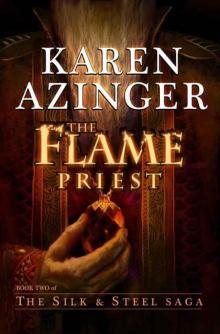 The Flame Priest (The Silk & Steel Saga)
The Flame Priest (The Silk & Steel Saga)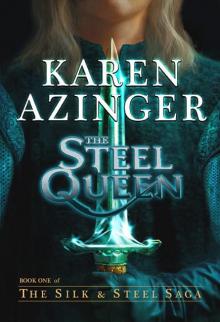 The Steel Queen (The Silk & Steel Saga Book 1)
The Steel Queen (The Silk & Steel Saga Book 1)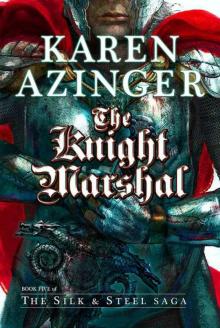 The Knight Marshal (The Silk & Steel Saga)
The Knight Marshal (The Silk & Steel Saga)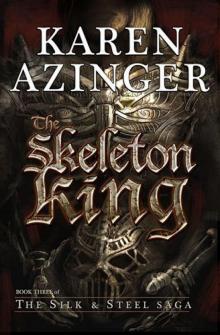 The Skeleton King (The Silk & Steel Saga)
The Skeleton King (The Silk & Steel Saga)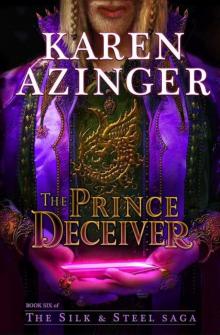 The Prince Deceiver (The Silk & Steel Saga Book 6)
The Prince Deceiver (The Silk & Steel Saga Book 6)